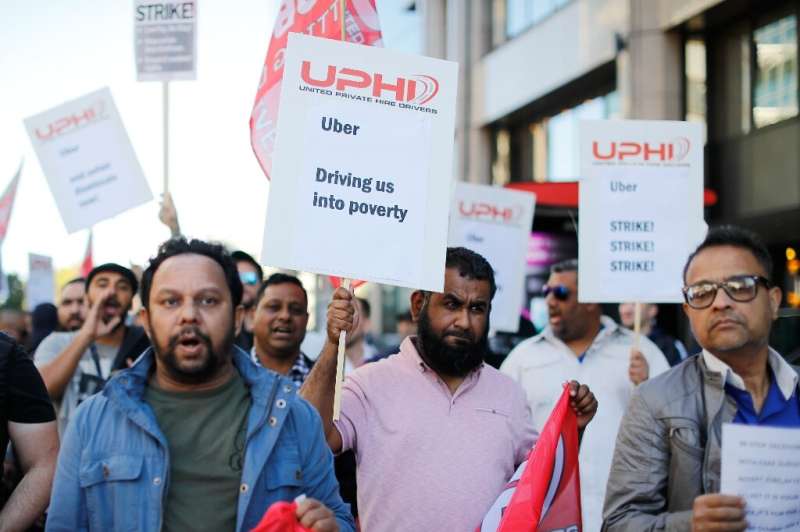UK top court shakes up gig economy with ruling against Uber

Britain's top court on Friday ruled that drivers at US ride-hailing giant Uber are entitled to workers' rights, in a judgement with huge implications for the "gig economy".
The Supreme Court's unanimous ruling that the drivers are workers followed a protracted legal battle with the Silicon Valley taxi and delivery company.
"This has been a gruelling four-year legal battle for our members—but it's ended in a historic win," said Mick Rix, from the GMB trade union.
"The Supreme Court has upheld the decision of three previous courts, backing up what GMB has said all along: Uber drivers are workers and entitled to breaks, holiday pay and minimum wage," he added.
The court ruled that the service performed by drivers was "very tightly defined and controlled by Uber" so they could not be considered to be self-employed.
The drivers were "in a position of subordination and dependency... such that they have little or no ability to improve their economic position through professional or entrepreneurial skill," added the ruling.
"The drivers were rightly found to be 'workers'," the six judges concluded.
Uber said it respected the ruling, and "will now consult with every active driver across the UK to understand the changes they want to see", according to Jamie Heywood, its manager for northern and eastern Europe.
Lower courts ruled in 2016, 2017 and 2018 in favour of a group of 20 Uber drivers who argued they were entitled to employee status given the length of time they had been working through the Uber app, and the way that the company oversaw their work.
Uber insisted that the drivers were self-employed since they choose their own hours and place of work, and often find passengers through rival apps.
The complainants can now ask an employment tribunal for compensation which could trigger far-reaching changes affecting all ride-hailing drivers.
"GMB will now consult with our Uber driver members over their forthcoming compensation claim," said Rix.
'Nail in coffin'
Lead claimant James Farrar said he was "delighted" by the ruling, claiming it would "fundamentally re-order the gig economy" in Britain—in which people do short-term work without formal contracts, or work without guaranteed hours.
The decision was "another nail in the coffin" for the gig economy, tweeted Rix.
Couriers for the Deliveroo food app are already fighting in the Court of Appeal in London for the right to collective bargaining.
But the Institute of Economic Affairs, a free-market think tank, warned that the Uber ruling would push up prices for users and affect the wider economy amid the coronavirus pandemic.
"When the logic is extended to other areas of the gig economy, we will see tens of thousands of young people unable to find any work at all at a time when conventional jobs will be very hard to come by," it said.
Uber claimed that it has already changed the way it works since the legal action began, and has been looking at alterations to its business model in the United States after adverse court rulings in California.
Chief executive Dara Khosrowshahi on Monday presented a series of promises to European governments and trade unions. He said the aim was to offer a transparent and fair pay structure, and more benefits to drivers.
Uber is calling for companies in the sector to form a joint fund that would allow drivers who work for different apps to be able to access protections and benefits such as paid holidays.
Friday's decision does not affect Uber's right to operate in London, which has been subject to a separate dispute.
The platform last September regained the right to operate in London for 18 months, after a court overruled a decision by city authorities to suspend its licence due to concerns over passenger safety.
London mayor Sadiq Khan welcomed the Supreme Court verdict.
"It is a landmark decision for people who suffer from low pay and a lack of security at work," he said.
"London is a tech powerhouse for the world—but employers must play by the rules."
© 2021 AFP




















